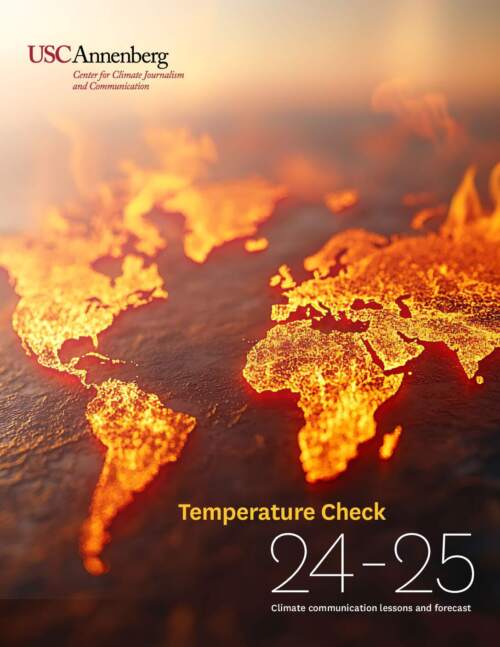Now is a critical time to rethink how we communicate about issues of climate change. In mid-November 2024, immediately following President Trump’s reelection, we sent our second annual “Temperature Check” survey to climate communicators across the world.
With the dramatic shift from Biden’s stance on climate change to the science denialism of the current administration, many communicators predicted major changes in policy — and therefore — communication. A major concern of respondents was extreme weather events, including uncontrollable wildfires.
On January 7, 2025, shortly after our survey closed, wildfires broke out across Los Angeles. Though the city has always been prone to devastating wildfires due to its dry weather, strong winds, and highly flammable vegetation — this risk has significantly increased in recent years due to climate change.
The sheer scale and volume of the fires — burning tens of thousands of acres — was unprecedented. The Palisades and Eaton fires are now considered among the deadliest in California history, taking at least 29 lives, destroying over 16,200 structures, and resulting in property losses and damages estimated to be as high as $164 billion.
As Los Angeles continues to grapple with the aftermath of these wildfires, climate communicators are faced with the daunting reality that a large portion of the country, including those in the highest offices in the land, do not believe climate change exacerbated these fires, or that climate change is a problem to begin with.
For some, climate change communication may seem pointless.
Though our survey respondents highlight many areas needing improvement, they also offered words of encouragement, and even hope. As climate policies are rolled back, funding slashed and the future uncertain, climate communicators are more critical now than ever before.
“Temperature Check” highlights those doing this important work, and offers advice to those who want to get involved, but aren’t quite sure where to start.
If there’s anything this report has shown us, it’s that we’re all in this together. “Temperature Check” has brought together journalists, scientists, researchers, and more from all corners of the U.S. and the world. The Earth is the only thing all humans have in common, and without climate communication — it’s easy to forget that.
Grace Galante is a research assistant for the Center for Climate Journalism and Communication.
